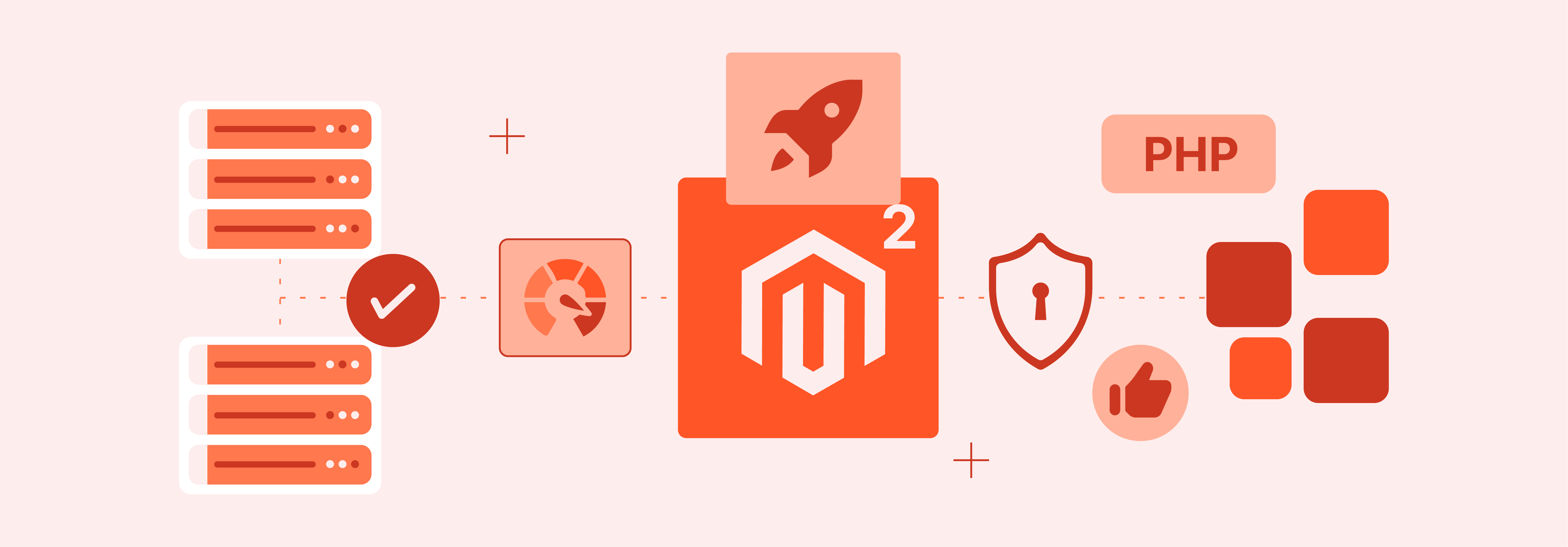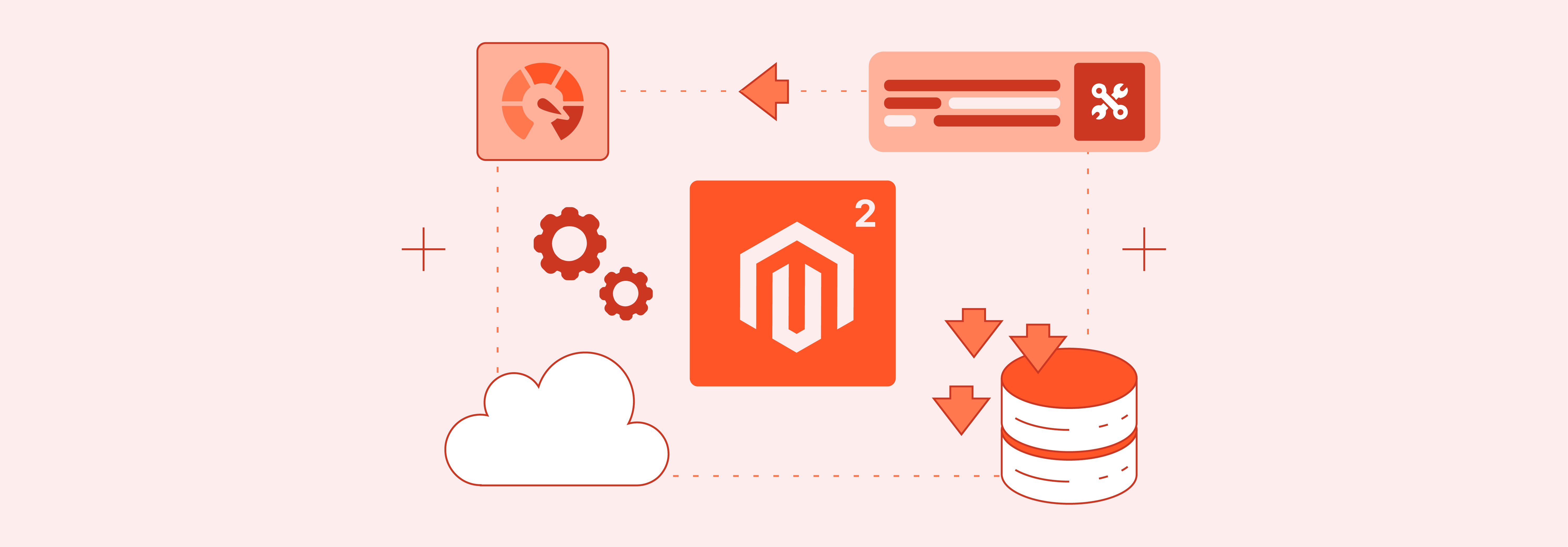
How to Get the Fastest Magento 2 Hosting
Every ecommerce business running on Magento seeks the fastest Magento 2 hosting plan. This article explains the technical requirements and optimizations needed to enhance the speed of your Magento store.
Key Takeaways
-
A slow Magento hosting plan affects page load speeds, impacting user experience and increasing bounce rates.
-
Your server environment must meet specific technical requirements to reach the optimal speed and performance.
-
Selecting a hosting provider that specializes in Magento environments is important for scalability, server resources, and technical support.
-
Regular maintenance and optimization are needed to obtain fast and reliable Magento hosting.
-
The future of Magento 2 hosting is shaped by advancements in cloud hosting and the increased role of AI and machine learning.
Challenges Faced with a Slow Magento Hosting Provider

1. Reduced Page Load Speeds
Slow Magento hosting solutions directly impact page load times, which is critical for user experience. Slow-loading pages frustrate users, increase bounce rates, and negatively affect brand perception.
2. Lower Search Engine Rankings
Page speed is a known ranking factor for search engines like Google. Slow Magento sites may suffer in search engine results pages (SERPs), making it harder for potential customers to find the store.
3. Poor Customer Satisfaction and Loyalty
Slow site performance leads to poor customer experiences. Customers are less likely to return to a site that is consistently slow or difficult to navigate. It can erode loyalty and repeat business.
4. Increased Abandonment Rates
Slow loading times, particularly during the checkout process, directly correlate with higher abandonment rates. Shoppers are impatient and are likely to abandon their carts and shop elsewhere if pages take too long to load.
5. Operational Inefficiencies
A slow hosting platform can hinder the backend management of a Magento store. It affects everything from updating product listings to processing orders. This inefficiency can increase the operational workload and costs, reducing the overall productivity and profitability of the business.
Significance of Speed for an Ecommerce Platform

A fast Magento store enjoys the following advantages:
1. Improved User Experience
Fast loading times keep users engaged and make it easier for them to browse products, add items to their cart, and complete their purchases. A seamless and efficient shopping experience encourages repeat visits and customer loyalty.
2. Higher Conversion Rates
There is a direct correlation between page load times and conversion rates. The faster a website loads, the more likely visitors are to make a purchase. Even a one-second delay can lead to a significant drop in conversions, as customers are less willing to wait and more likely to seek alternatives.
3. Reduced Bounce Rates
Speed also plays a crucial role in reducing bounce rates. If a website takes less time to load, users are more likely to leave before interacting with the site. A fast-loading e-commerce platform ensures that potential customers stay on the site longer.
4. Enhanced SEO Ranking
Search engines like Google consider page speed to be a ranking factor for both desktop and mobile searches. Faster websites are more likely to rank higher in search results. It leads to increased visibility, more organic traffic, and more sales opportunities.
5. Increased Customer Satisfaction
Quick page loads contribute to a positive shopping experience, increasing overall customer satisfaction. Satisfied customers are more likely to become repeat buyers and advocate for your brand through word-of-mouth and social media.
6. Competitive Advantage
In the competitive e-commerce landscape, speed can be a differentiator. Offering a faster, more responsive platform can set your business apart from competitors. It helps you attract more customers who value efficiency and convenience in their shopping experience.
Technical Requirements for Fastest Magento 2 Hosting

For Magento 2 to run efficiently and provide a fast, reliable experience for users, your hosting environment must meet specific technical requirements.
1. Server Environment
-
Operating System: Linux distributions such as CentOS, Ubuntu, Debian, or RHEL are recommended. Windows and macOS are supported for development only.
-
Web Server: Apache 2.4 or Nginx 1.x. These web servers are well-suited for Magento 2 and provide the flexibility needed for URL rewriting and other Magento features.
-
Database: MySQL 5.7 or higher is necessary for Magento 2.4. MariaDB and Percona are compatible alternatives that can be used as well.
-
PHP: Magento 2.4 requires PHP 7.3.x, 7.4.x. Support for PHP 8.0 and higher may vary with different Magento 2 versions. It's critical to use the PHP version that is compatible with your Magento version to avoid compatibility issues.
-
Elasticsearch: Required for Magento 2.4 and later versions for catalog search capabilities.
2. Required PHP Extensions
Several PHP extensions are necessary for Magento 2, including, but not limited to:
-
bc-math: The BC Math (Binary Calculator Math) extension enables arbitrary-precision arithmetic operations. It's useful for calculations that require a high degree of precision beyond what floating-point arithmetic can provide. -
ctype: This extension checks for the type of character according to the current locale. It determines whether a character is alphanumeric, digit, lower case, upper case, etc. It's helpful for data validation and sanitization. -
curl: cURL is a library that allows you to make HTTP requests in PHP. This extension is essential for fetching data from the web, making API calls, downloading files, etc. -
dom: The DOM extension allows for operations on the Document Object Model (DOM). It enables PHP scripts to manipulate HTML and XML documents dynamically. It's crucial for web scraping, web services, and processing XML data. -
gd, ImageMagick 6.3.7 (or later), or both: Both GD and ImageMagick are image processing libraries. They allow for the creation and manipulation of images, such as resizing, cropping, and converting between different image formats. ImageMagick provides a broader set of functionalities than GD. -
intl: The Internationalization extension, based on the ICU library, provides internationalization support to PHP applications. It includes functionality for formatting numbers, dates, and strings according to locale settings. It also provides locale-aware string comparisons. -
mbstring: Multibyte String extension provides functions for dealing with multibyte encodings in PHP. It's essential for internationalization, allowing operations on strings in character encodings like UTF-8. -
hash: This extension provides hashing functions, allowing for the generation of hashed strings. It supports various hashing algorithms and is used for data validation, securing passwords, and ensuring data integrity. -
openssl: OpenSSL is used for secure communication over networks. It provides cryptographic operations like secure socket layer (SSL) and transport layer security (TLS) protocols for encrypting connections. -
PDO/MySQL: PDO (PHP Data Objects) is a database access layer providing a uniform method of access to multiple databases. PDO/MySQL is a driver that implements the PDO interface for the MySQL database. It allows secure and flexible database operations. -
SimpleXML: SimpleXML provides a toolset to convert XML to an object that can be processed with normal property selectors and array iterators. It's useful for parsing and manipulating XML data. -
soap: The SOAP extension provides a way for PHP applications to communicate with SOAP servers and clients. It's used to build web services based on the SOAP protocol. -
xsl: The XSL extension is used to transform XML documents into other XML documents, HTML, or other types of documents. It does so using XSLT (Extensible Stylesheet Language Transformations) stylesheets. It's useful for dynamically rendering XML data. -
zip: This extension enables reading from and writing to ZIP files. It supports creating ZIP archives, extracting files from ZIP archives, and listing ZIP file contents. -
ext-sockets: The Sockets extension provides a low-level interface to socket communication. It allows for the creation of network sockets, enabling data exchange between connected network endpoints.
3. Recommended Technology Stack (LAMP/LEMP)
-
LAMP: Linux, Apache, MySQL, and PHP is a traditional stack for Magento hosting, suitable for most Magento 2 stores.
-
LEMP: Linux, Nginx (pronounced as "Engine-X"), MySQL/MariaDB, and PHP are alternative stacks known for their efficiency, especially in handling static content and higher concurrency.
4. Performance and Security Enhancements
-
SSL Certificate: For secure HTTPS connections. Magento 2 requires SSL for admin and checkout by default.
-
Content Delivery Network (CDN): Utilizing a CDN can significantly improve site load times for users located far from the server.
-
Caching Mechanisms: Tools like Varnish Cache (recommended for full page caching), Redis (for session and backend caching), and Memcached can enhance performance.
-
OPcache + APC: To optimize PHP performance by storing precompiled script bytecode in shared memory, thereby removing the need for PHP to load and parse scripts on each request.
5. System Resources and Configuration
-
Processor: A modern, multi-core processor is recommended for processing Magento's PHP scripts efficiently.
-
RAM: Magento 2 requires a minimum of 2GB RAM for installation. For production environments, 4GB is the recommended starting point. More RAM is required as store traffic and complexity increase.
-
Disk Space: At least 2GB of free disk space is needed for the Magento 2 application and sample data. Solid-state Drives (SSDs) are recommended for faster data access speeds.
Best Practices for Magento 2 Server-Side Optimization

Choose the best hosting provider that offers a fully optimized Magento 2 server.
1. Choose the Right Hosting Provider
Your Magento web host is the foundation of your store's performance. A reliable Magento hosting provider specializes in Magento environments. It offers optimized server configurations that cater to Magento's specific needs.
2. Choosing Cloud Hosting Solutions
Magento cloud hosting offers scalability and reliability, which are essential for handling traffic spikes and maintaining speed. Providers offering Magento-optimized cloud solutions ensure your Magento store remains fast and responsive.
3. Prioritizing Server Location
Choose a hosting service with server locations close to your target audience. Server proximity significantly reduces latency, improving load speed for a faster shopping experience.
The Role of Regular Maintenance

Regular maintenance can make a huge difference in the speed of your Magento website.
1. Implement Effective Caching Strategies
Utilize Magento 2's built-in caching mechanisms and consider third-party extensions to minimize server load and speed up content delivery.
2. Optimize Images
Large image files can slow down your Magento 2 store. Employ image optimization techniques and tools to compress images without sacrificing quality.
3. Database Optimization
Regularly clean up your database to remove unnecessary data and optimize its structure. It reduces the load on the server, allowing for quicker data retrieval and a speedier site.
Configuring Magento 2 for Optimal Performance

The following configurations can greatly enhance the performance of your Magento 2 eCommerce store.
1. Enable Flat Catalogs
Reducing database load by using flat catalogs for products and categories can significantly improve response times for your Magento store.
2. Utilize Magento's Compilation Feature
Compile your Magento 2 store to reduce filesystem reads, improve cache performance, and speed up your site.
3. Configure Magento Indexing Correctly
Ensure that your indexing settings are optimized to update on schedule, preventing any potential slowdowns during peak times.
Employing Built-in Tools and Extensions

Magento 2 comes with built-in tools and extensions that can deliver a faster browsing experience to your customers.
1. Built-in Performance Analysis Tools
Use Magento 2's built-in tools, like the Performance Toolkit, to identify bottlenecks and optimize your site's performance.
2. Third-Party Performance Extensions
Explore extensions that can further optimize your store's speed. The extensions offer features like advanced caching, image optimization, and database management solutions.
3. Managed Magento Hosting Services
Consider managed hosting solutions that take care of server management, performance optimization, and security. It frees you from technical responsibilities, allowing you to focus on growing your business.
Emerging Trends in Magento 2 Hosting

The emerging trends in Magento 2 hosting can further increase the speed with which you can cater to your customers.
1. Cloud Hosting Advancements
Advancements in cloud technology ensure that Magento installations can handle varying loads efficiently. Serverless computing and auto-scaling resources provide optimal site speed and performance, even during traffic surges.
2. Green Hosting
Green hosting, which utilizes renewable energy sources to power data centers, is gaining traction. The best Magento hosting providers are increasingly adopting eco-friendly practices. It helps reduce the carbon footprint of online stores and aligns with the values of eco-conscious consumers.
3. VPS and Dedicated Hosting Innovations
Traditional hosting solutions like VPS hosting and dedicated hosting continue to evolve with improvements in hardware and network technologies. These hosting options offer Magento installations with dedicated server resources, ensuring high performance and security.
4. The Potential Impact of AI and Machine Learning on Hosting Solutions
AI and ML are set to transform Magento hosting solutions. These technologies can automate routine tasks, predict and manage traffic flows, and enhance security measures.
AI-driven algorithms can optimize server resources in real time, ensuring the fastest Magento hosting performance possible. AI can also play a crucial role in cybersecurity, detecting and neutralizing threats before they impact site speed or uptime.
FAQs
1. Why is choosing the right hosting provider crucial for Magento 2 performance?
Choosing the right hosting provider is essential because Magento 2 is a resource-intensive platform. It requires specific server configurations for optimal performance. A provider specializing in Magento environments can offer the necessary server resources, technical support, and optimized configurations.
2. How do regular maintenance and optimization improve Magento 2 hosting performance?
Regular maintenance and optimization help in sustaining high performance for Magento 2 hosting. Implementing effective caching strategies, optimizing images, and cleaning up databases contribute to faster page load speeds. These practices also help in handling traffic spikes efficiently, ensuring maximum uptime for your Magento store.
3. What technical requirements should my Magento 2 hosting environment meet?
Your Magento 2 hosting environment must support specific technical requirements to ensure compatibility and performance. These include running on a Linux-based operating system, Apache 2.4 or Nginx 1.x as the web server, and MySQL 5.7 or higher for the database.
PHP 7.3.x or 7.4.x is required, along with essential PHP extensions like bc-math, ctype, curl, dom, and more. Elasticsearch is also necessary for catalog search capabilities in Magento 2.4 and later versions.
4. How can cloud hosting advancements benefit my Magento 2 store?
Cloud hosting advancements provide scalable, flexible, and efficient solutions for Magento 2 hosting. Features like serverless computing and auto-scaling resources allow for the automatic adjustment of server capacities based on traffic demands. It not only enhances the user experience but also helps manage costs effectively by paying only for the resources used.
5. Can AI and machine learning significantly impact Magento 2 hosting solutions?
AI and machine learning have the potential to transform Magento 2 hosting solutions dramatically by automating management tasks. These technologies can also optimize server resource allocation in real time and enhance security measures. AI algorithms can predict traffic flows, adjust resources to ensure fast loading times and mitigate security threats proactively.
Summary
To obtain the fastest Magento 2 hosting, adhere to the outlined technical requirements and commit to regular maintenance. Staying abreast of emerging trends will ensure that your Magento hosting remains efficient, secure, and competitive. Get access to a high-speed Magento optimized server that helps increase conversion rates.



